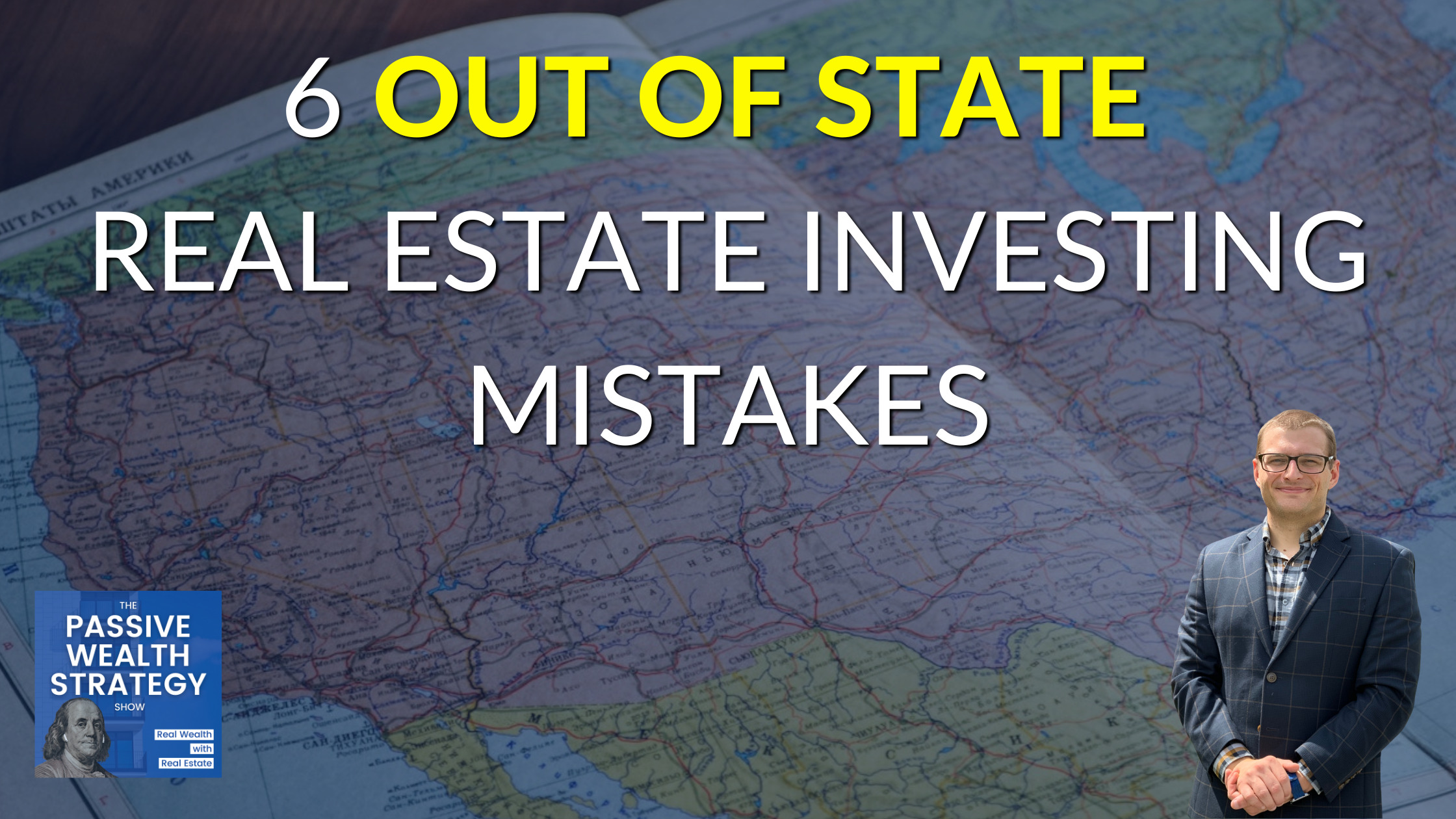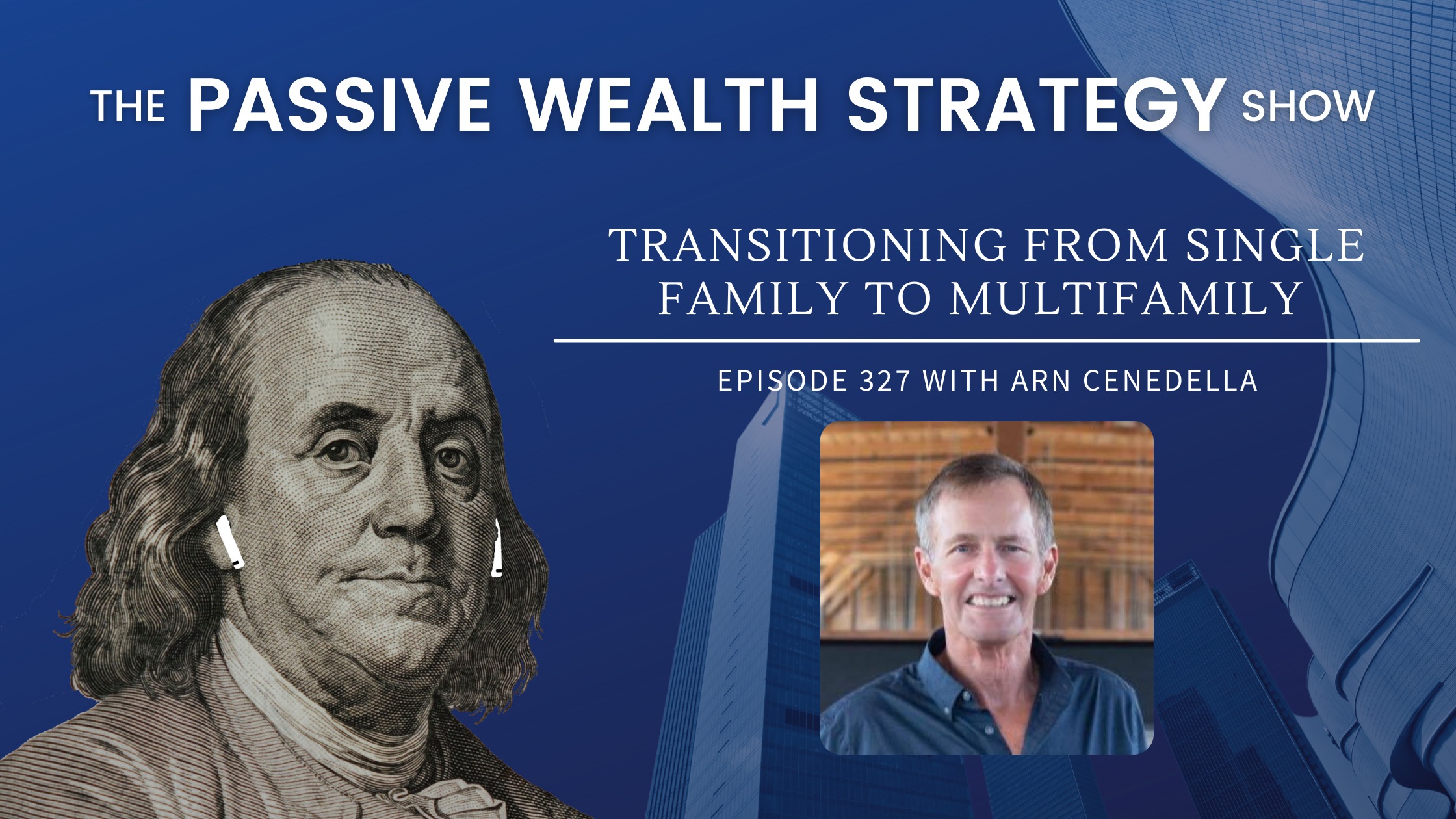
Transitioning from Single Family to Multifamily with Arn Cenedella
Arn. Great to talk with you again. Thanks for coming back on the show.
Hey Taylor, great to see you and catch up a little bit and find out what you’ve been doing. So a. Happy to be here and happy to share hopefully some helpful information with your audience.
Absolutely. For the audience, I’m going back to, some of my favorite guests who have been on this show in the past and circling back up, seeing how things have changed with them.
And how they’ve progressed along, in their businesses and their wealth generation goals. And ours has been on the show in the past and, I’d encourage everybody to go back and listen to that once a year. You’re done with this, but, give us an update as to, what you’re up to.
And for folks that didn’t listen to the first interview a little bit about your background and then we’ll get back
up to speed. I think your podcasts were probably one of the first I was on probably about. 1618 months ago. So I appreciated the opportunity then I was much more nervous then than I am now.
So it’s a learning experience. I’m a long-time real estate broker and investor who got into the real estate industry back in 1978 in Menlo Park and Palo Alto, California. Which are basically Silicon valley and had a nice career there in residential brokerage built a fairly sizable single-family portfolio.
And seven years ago moved to Greenville, South Carolina. And my background, you can see the Liberty bridge, which is a landmark for Greenville, and love it here. And about two years ago, maybe 18, 20 months ago. Decided to transition my single-family business, my single-family rental portfolio into multifamily.
So I’ve been working hard at that and starting to make some headway, getting into the multifamily space over the last, 18 months has been great to work a new. The aspect of the real estate business that I’ve spent my entire life and always energize in to learn new stuff. And so now I’m a multifamily investor.
Multifamily syndicators have completed about five syndications and looking to do more, looking to help others. Individuals busy professionals benefit from passive investing in multifamily syndication.
That’s great. And I really appreciate that. You, I think a lot of folks, if they had, had that depth and breadth of experience in single-family and, success would have just said, wow, what am I going to make a shift for?
Why am I going to make a change? This is good enough. Whereas you saw an opportunity. And you went for it, which I think is really commendable and admirable. And I’d like to, really get into that psychology of making that shift and how went through that, especially now, you have the benefit of hindsight now that you’ve done a bunch of these multifamily deals, whether w whether it was the right decision.
So let’s get into all of that.
Sure. When I moved to Greenville, I don’t know if it was retirement, but I didn’t really know what I was going to do. It was certainly a life transition. We love the San Francisco bay area. It’s a great place, but we were ready for a new adventure.
And I think when people make a transition. Oftentimes they enjoy doing nothing for a little bit of time. And then you realize you need to keep your brain occupied. There, there is a value to productive work, whether it’s giving to the community or helping others. And.
Single-family investing was great, but honestly, a couple of things, one, I was getting a little bored with it after doing it 40 years, I had done it. Been there, there wasn’t too much more to learn and to the actual cash flow, the net income I was putting in my pocket from the single-family rental.
Was relatively minimal compared to the equity I had in the single-family rentals. And as I’ve gotten older, I’ve moved more towards cash flow as opposed to capital growth and So it made sense to switch to multifamily, to increase my monthly income, increase my cash flow of the equity.
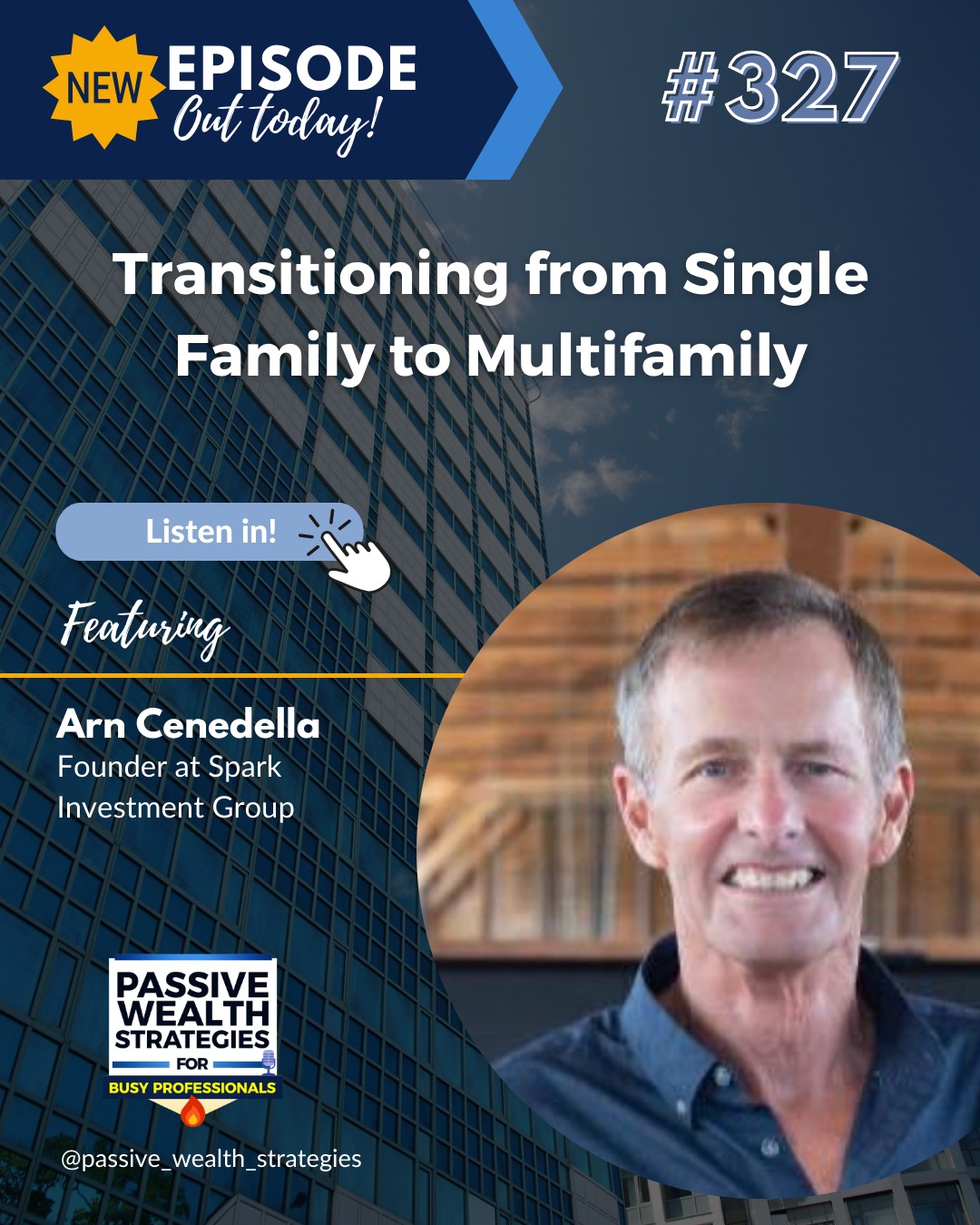
Transitioning from Single Family to Multifamily with Arn Cenedella
I had built over 30 or 40 years of investing in real estate and just the kind of pleasure enjoy of learning something new, albeit related. But. When you’re learning something new, I think it always energizes you, and so forth. The other thing is multifamily requires a team effort. You need to have a lot more partners and relationships and interact with a wider variety of individuals.
And I certainly enjoy that. A big part of my social sphere is in the real estate industry and the friendships I make through real estate investing. So it’s a wind situation on a lotta level. And so I’ve jumped in. Jumped in big and so far, so good. I’m enjoying it. And it’s doing well for me.
A big majority, if not all of them. Transition time. I don’t know the exact calendar, but I think it’s fair to say that the majority of your time and multifamily has been through COVID and especially making that transition. And that’s, I think an interesting set of circumstances to make that transition.
Everybody was forced to go online for this stuff. And, due diligence had to change. We had to do it differently, at least there for a little while. Scanning, that’s opened up a little bit since then, what are your thoughts about those circumstances and how they’ve impacted you and your transition from single-family to multifamily?
Great question. Initially. And really I did get into COVID right about the time. Sorry. I really transitioned to multifamily about the time. The United States of America became aware that COVID was here and it was a problem. And if you go back, it was probably, middle of March, late, March 20, 20, January, February, we heard rumblings about it.
We weren’t, come March, April. It was an issue and we knew we were in for some changes. And the chance phone call with a buddy of mine, who is a multifamily investor life here in Greenville with me, right at that time, got me on to it. And, many people were fearful at that time and concerned.
And so was I so I started making a few investments as a limited partner and that kind of took some thinking. I sold one or two rentals and transfer the capital into other people’s syndication deals. Kinda to get my feet wet. And then of course I continued my education process and no longer were there in-person boot camps or summits and all that.
It was all online, which is a certain way actually made it easier for me because. I don’t really enjoy playing travel. And of course, it’s been complicated with COVID. I took my first flight in two years about a month ago. So I’m basically content to stay on the ground, but I think with COVID and travel and in-person meetings going down.
Online summits and boot camps and networking events exploded. And so I was able to participate in them without having to get on a plane was maybe five years ago that would have been unheard of. The other thing I would say is being in the business since 1978, I’ve gone through lots of economic cycles, certainly the subprime crisis.
But I sold real estate when rates were 16 and a half percent for a home mortgage. I sold real estate when almost half of every savings and loan in America went bankrupt in the early 1990s. And people don’t even remember that earlier. People were 31, it knows about that. I’m generally an optimistic guy and I believe we’re going to keep moving forward and so forth.
So the fact that COVID hit didn’t freak me out. It still made sense to invest in real estate. And if I had my equity in single-family homes or multi-family properties, it didn’t really matter. I still want it to be invested in, I believe in real estate, long term. And as it turned out. Who knew multifamily values are now at historic peaks, COVID may have slightly paused the real estate market, the multifamily market for about three, four months.
But since that time, both the single-familymily market and the multifamily market have gone gangbusters. So who knew. Something terrible has happened, but the real estate market just kept through, and looking back, I wish I would have bought more 18 months ago then than what I could do now. Prices have gone up.
Yeah, I think, looking back, I wish I would have bought more six years ago.
It’s always easy to look back.
And especially when the market has gone well, but I’m glad that you brought up, past recessions, the savings and loan crisis. I think one of the things that have flavored or shadowed the real estate market, obviously for this whole site, For the last more than a decade, is the great recession, right?
That tanked values. And now we all expect recessions to come along with a huge crash in real estate, but that’s not actually this typical flow of a recession. Most of the time, you don’t get a 40% drop in real estate values. You might get a slight pause. But most of the time real estate market doesn’t fall apart.
And I’m glad that you brought up your experience in the savings alone, moving forward, how can we think, today could rates go back to mortgage rates, go back to 16%. They’re at a buddy of mine who had just bought a property. I think he was paying 4% interest only on a triplex for seven years and he didn’t have to put much down.
That’s not a low percentage, but that’s basically free money. It’s pretty
magical.
Yeah. I say guys getting, three or two and a half, which is free money, but, especially given your decades of experience, what do you think about, the future? If you look in your crystal ball,
Yeah, that’s a good question.
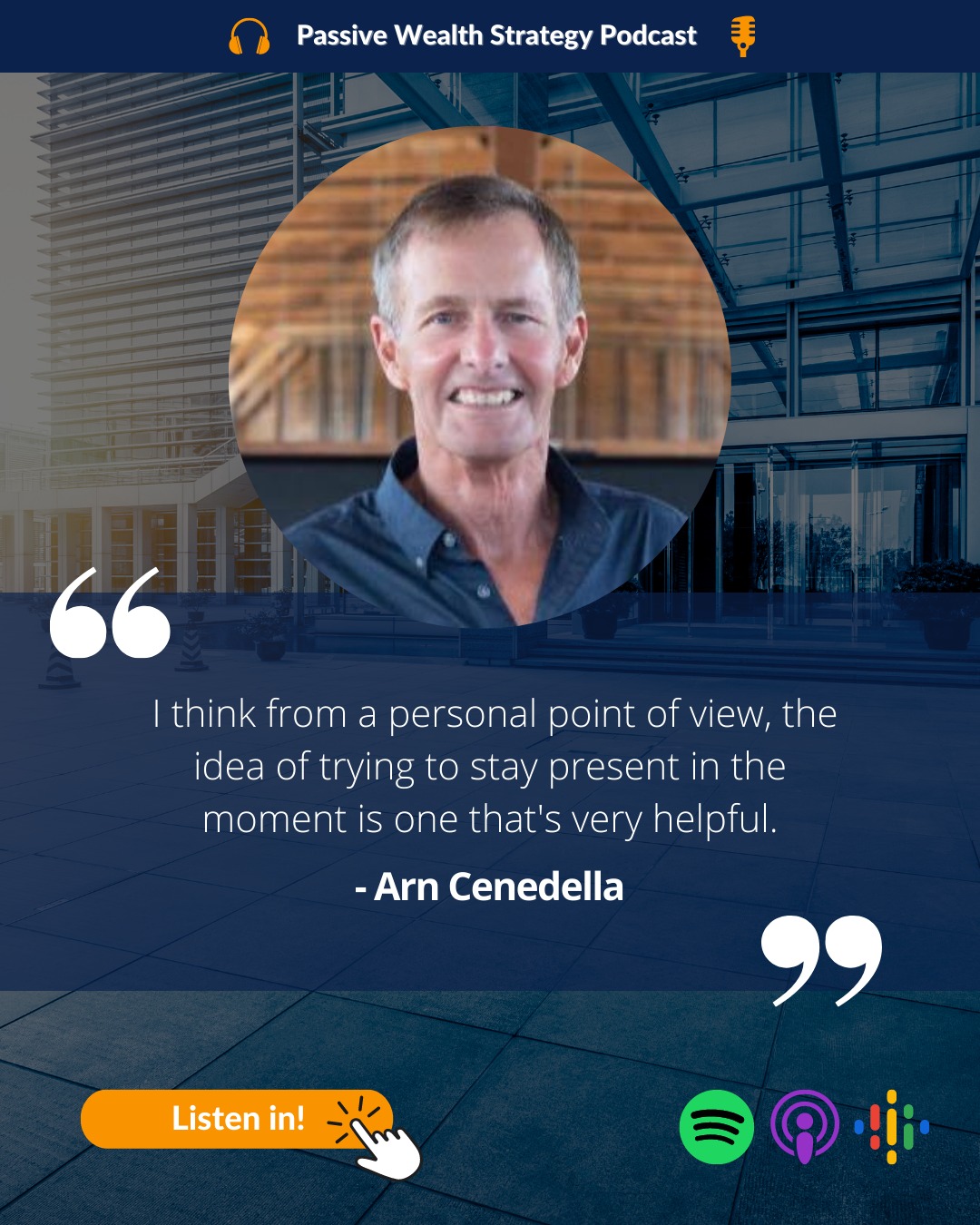
I think from a personal point of view, the idea of trying to stay present in the moment is one that's very helpful.
Arn Cenedella Tweet
I’m a smart guy. I pay attention, but I also have a fair amount of humility and, the truth is nobody knows. All right. Two and a half years ago, who would’ve thought a virus would a. Brought the world to a stop, right? It’s, we’re in the 21st century, we should be able to deal with this stuff.
No problem. Who would have thought we had ever had two and a half percent interest rates who would have thought we would have negative interest rates in Europe? So there seems to be two, two schools of thought about interest rates and your. Exactly right. Because clearly the value of the real estate is tied to interest rates.
Cap rates are impacted by interest rates. So it’s a legitimate question. It’s the $64 million question in the commercial real estate space. Now, so one school of thought says, Hey, we’re going to have inflation. And therefore, generally. The federal reserve board raises interest rates, the kind of cool inflation, and keeps the economy in check.
Okay. I could see that happening. On the other hand, the other school of thought would say the economy is still fairly weak. We need to keep the economy going. In addition, all of these governments have used. National debts. And so if the powers that be led, interest rates go up, all of a sudden their debt service goes up.
So it’s an interesting question. When the borrower let’s call it, uncle Sam gets to determine what loan rate they pay. It’s an interesting quandary. If you think about it that way. So that school of thought is going to say, rates are gonna stay down for a little. My best guess is we may have a little disruption say about a year or two for now.
That would be my projection. The next 12, 18 months are going to be steady as she goes. I would anticipate a little disruption, maybe two years from now. The follow-up question to that of course is when you acquire a multifamily property, Do you get bridge debt or do you get long-term agency debt?
And I’m being an old school guy and real estate 1 0 1 rules run O one is the way you win at real estate is you lock in long term fixed rate that. And that’s the secret, that’s the advantage of real estate. On a couple of my acquisitions that are currently under process. I’m really trying to get that long-term fixed-rate debt because if there is a little disruption here a year or two years from now, I won’t be forced.
My investors won’t be forced to refinance. To what could be a volatile interest rate market two years from now, right? Long-term clearly housing’s in demand. We have a shortage of housing here. We are going to have inflation. So the long-term prospects for real estate are good. I just want to protect about that little disruption that I think maybe a year, two years from now.
Keep this recorded and you could play it back for me in a couple of years and say our news is so wrong or are newer, so right. Or you were 50 50 yet.
I don’t know. But I think the reality is that from a pure supply and demand of the assets standpoint, most major metropolitan markets already have a huge house housing shortage.
And in the future, we’ll have an even bigger housing shortage just based on what’s planned right now. But like you’ve been talking about the big question really comes down to the cost of capital. That’s a huge question, especially as we’re looking into the future as real estate investors, that’s really what went wrong with the real estate market during the great recession.
It wasn’t that real estate started socking and started falling apart. It’s that the capital markets had such turmoil they’d had such over-investment or mal-investment and then things change. And that, that really impacted me very heavily. I also want to ask your words of wisdom for folks out there who, cause I know I’ve spoken with listeners who have single-family portfolios and are thinking about making the shift either as an active syndicator like yourself like you’re doing now.
You also did a passive syndication investment. What are you looking at? Maybe some things that you did right along the way, or maybe some mistakes that you made in selling properties and reallocating into multi-family. What are your thoughts for the folks out there who are thinking about making that transition that you did?
So great question. Generally not someone who has many regrets. I try to make the best decision I can at the time. And I go on and I tend to try to be forward-looking looking back considering how much fun and enjoyment I’m having in the multifamily space. I was trained as a chemist.
I have a master’s degree in chemistry. I love math. I’m scientific and maybe the commercial space really fits me better than the residential space. So maybe I could have made that switch a little earlier. Also as you scale up. You’re able to bring in partners who can. Support you fill in the areas that you’re weak and allow you to do what you do best where I think at the single-family level, it’s you can do it all and, and maybe you’re good in certain areas.
Maybe not as good as in others. So I think moving in multifamily allows more of a team approach where you’re straining. Our maximize your weaknesses are covered up or filled by other people. Investing in single-family properties is a tried and true way to achieve financial success and independence. Nobody could ever convince me that’s a bad approach. I think. A lot of, it just depends on how actively an individual wants to be involved. And I think that’s really the question as to where they take their investing.
If they’re busy in their career or their community or their church or their family, or they have other passions and want to go windsurfing three months a year, then obviously taking a more passive approach is going to work. And like many decisions, it comes down to your emotional needs and wants and how you want to spend your time.
So I think either is fine. I think it just depends on what you want to do.
Nice. I appreciate that. And like you said,, the single-family model is proven and tried. And it’s been done many times over for a very long time. But that’s what we’re all about here is that passive aspect than how active people want to be in their investments.
So certainly appreciate that right now. No, we’ll go right here. Go. No. I was going to move us onto the three questions, but,
Let’s go with the three questions. No, that’s fine. Let’s go with the three
questions. Right now we’re going to take a quick break for ours. All right. On a, as I got three questions.
I ask every guest on the show, but you’ve already answered those questions. So we got three new ones for,
oh man. I didn’t know. You had three new ones coming up. All right, I’ll go back through my notes.
All right we’ll get into them. First one. What is your favorite book to read for personal reasons?
Personal enjoyment.
I’d say for personal growth on some level is serenity and in a crazy hectic world, contemporary life it’s an old school book. It’s the power of now by Ekar tole, where he talks about. To the degree, we can stay in the present moment. Everything’s okay. And we can enjoy that when we start thinking about the past or worrying about the future, then more trouble comes in.
So I think from a personal point of view the idea of trying to stay present at the moment is one that’s very helpful and it’s helped me quite a bit. Yes.
We had your favorite personal book. Now we go to the other side for that reason that people read really in this business is your favorite business book.
What is your favorite business?
book? I’d say right now, my go-to book is the best-ever syndication book. As that going. Into that. And I read it probably, 14 months ago and I refer back to it from time to time. So that’s a great book, a great source material for all aspects of the syndication business.
And that’s helping me quite a bit right now.
The third question for our returning guests is awareness. Are you going once the world is back? From COVID once this is all over where you go on a vacation where you travel.
Yeah, that’s a good question. So we’re more road trip people than an airplane, triple air airplane people.
And we’ve been in Greenville, South Carolina for seven years, but we haven’t made it yet to the outer banks of North Carolina. So it’s about six, seven hours. So I think that will be a place we’ll get to soon rustic. I think we’ll enjoy it. It’ll be quiet. And so it’s the outer banks where we want to go.
Oh, and it’s been great catching up with you again and learning about how things have changed in your business and getting some of those lessons that you’ve learned in your hindsight. About, what’s changed or what you think about what you think might be coming down the road. But also I think it’s great that you maintain perspective and maybe like humility about whether or not we can really put him predict the future or not.
That’s very responsible.
I try to.
if folks want to reach out, if they want to get in touch with you, if they want to learn about what you’re up to or anything like that, where can they track?
Sure. My, my company’s name’s spark investment group and you can find me on LinkedIn or Facebook. Email is [email protected].
And my website is Invesco sparked.com myself from Silicon valley that I’ve kept 6 5 0 5 7 5 6 1 1 4. So give me a jingle any time, love to talk. And if you ever come to Greenville, South Carolina, look me up. Be happy to show you around.
Awesome. Thanks for coming back on the show. It’s been great catching up with you once again with everybody out there.
Thank you for tuning in. If you’re enjoying the show, please leave us a rating and review on the apple podcast. Five stars. If you don’t mind, I appreciate that so much that helps other people learn about the show, because that helps us rank higher in the apple podcast ecosystem. That I’m always honest with you guys.
It gives me a nice little warm and fuzzy feeling because I get to see the year engaging with the content and you’re escaping and the wall street casino, along with us. I’m glad you like it, if you know anyone who could use a little bit more passive wealth in their lives, please share the show with them and bring them into the tribe.
Thank you for tuning in once again. I hope you have a great rest of your day and we’ll talk to you on the next one. Bye-bye.
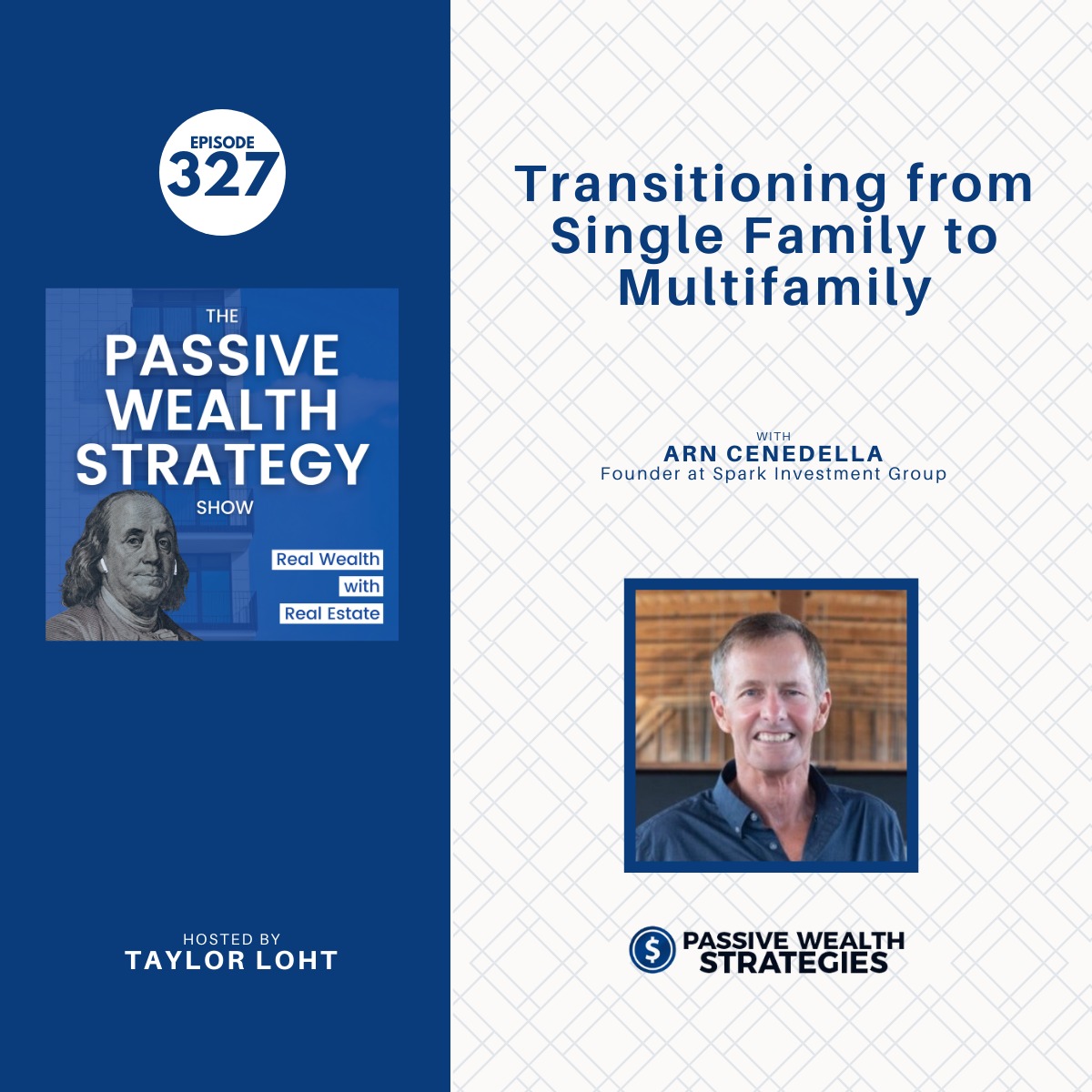
Arn Cenedella Comes Back On The Passive Wealth Strategy Show
About our Guest

Arn Cenedella
Arn Cenedella, founder of Spark Investment Group, is a real estate expert with more than four decades of experience, including 35 years as a Realtor navigating the unique real estate landscape in Silicon Valley, CA.
During that time, Arn invested in real estate ranging from single family homes and fix-and-flips to land subdivisions and condominium conversions to commercial multifamily properties.
Through these experiences, he developed a passion for helping others achieve their own financial freedom through investing in multifamily real estate syndications.
Through Spark Investment Group, Arn is putting his decades of real estate expertise to work for his clients, helping them reach their goals and attain the lives they’ve always wanted to live.
Episode Show Notes
Arn Cenedella, founder of Spark Investment Group, is a real estate expert with more than four decades of experience, including 35 years as a Realtor navigating the unique real estate landscape in Silicon Valley, CA. During that time, Arn invested in real estate ranging from single family homes and fix-and-flips to land subdivisions and condominium conversions to commercial multifamily properties. Through these experiences, he developed a passion for helping others achieve their own financial freedom through investing in multifamily real estate syndications. Through Spark Investment Group, Arn is putting his decades of real estate expertise to work for his clients, helping them reach their goals and attain the lives they’ve always wanted to live.
[00:01 – 05:17] Opening Segment
- Get to know Arn Cenedella
- A long time in real estate
- Learning from his father’s old school practices
- Arn’s real estate journey
[05:18 – 10:57] Running Your Properties
- The state of Arn’s rentals
- A mixture of both remote and local rental properties
- How to Run an Investment Property Portfolio
- Steps to Follow and Things to Know for You REI Success!
[10:58 – 27:53] Transitioning from Single Family to Multifamily
- Arn tells the story of how he shifted from single to multi
- How COVID became the switch to Arn’s switch
- “There’s a lot to like about multifamily.”
- Just hit line drive base hit after base hit after base hit
- Why you have to dig a little deeper and look at the specifics
- What Arn looks for in syndications
[27:54 – 40:05] Closing Segment
- Quick break for our sponsors
- Groundfloor offers short-term, high-yield real estate debt investments to the general public. Check www.passivewealthstrategy.com/groundfloor/ to get started.
- What is the best investment you’ve ever made other than your education?
- An old ugly house
- Arn’s worst investment
- An old rundown duplex
- What is the most important lesson that you’ve learned in business and investing?
- “There is karma.”
- Connect with my guest. See the links below.
Tweetable Quotes:
“If you invest in the good areas, you get market appreciation, you can also force appreciation by improving the property and managing it and running it better course you get the tax benefits.” – Arn Cenedella
“Yes, it’s a business and we want to make a return. But we also have some kind of larger duty. And in fact, doing the right thing is most often good business anyway.” – Arn Cenedella
“There’s a way to be a successful investor, and you can go about it with integrity.” – Arn Cenedella
————
Connect with Arn Cenedella through 650-575-6114, [email protected], Facebook, and LinkedIn. Visit their website https://investwithspark.com/.
Invest passively in multiple commercial real estate assets such as apartments, self storage, medical facilities, hotels and more through https://www.passivewealthstrategy.com/crowdstreet/
Participate directly in real estate investment loans on a fractional basis. Go to www.passivewealthstrategy.com/groundfloor/ and get ready to invest on your own terms.
Join our Passive Investor Club for access to passive commercial real estate investment opportunities.
LEAVE A REVIEW + help someone who wants to explode their business growth by sharing this episode or click here to listen to our previous episodes







